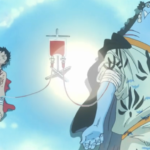Curse Of The Promise-Breakers

Which matters more: helping the poor or keeping your promises?
Which matters more: being “true to yourself”1 or keeping your promises?
What matters more: defeating enemies and defending your family, or keeping promises?
More people are ignoring or rejecting the simple virtue of keeping one’s promises. The results are ugly—for more than just national elections.
Fantastical stories often show the beauty of fulfilled promises, or vows, or oaths.2
I actually got started on this topic thanks to the anime series One Piece.3 Mild spoilers here: In the “Thriller Bark” story arc, the Straw Hat Pirates encounter a man who has been lost at sea for 50 years, separated from his original dead crew. Brook has taken drastic means to survive. And like most heroes of shōnen anime, this person also has a Dream that he will train for and work hard and do anything to get.

Yet unlike the Straw Hat crew members who have ambitious dreams—to be King of the Pirates, the best swordsman, the best cook, a brave warrior, a great doctor—Brook’s dream (as I know so far) is beautifully different. He simply wants to keep a promise he made to a crew member he left behind.
“When we set sail, we vehemently swore that we would return. But then we were annihilated on these seas, preventing us from keeping our promise. As the sole survivor from our ship, it is my duty to tell him what has happened! … What right do I have to decide whether or not he’s still waiting? If he’s still waiting for us, believing that we’ll keep our promise…Can you imagine how lonesome he must feel?”
Soon after I enjoying this story, I re-viewed The Lord of the Rings: The Return of the King film and found oaths, vows, swears, and promises all throughout that story. Every moment lifts up the heroes and cultures that value strength, courage, and the fulfillment of vows:
-

“Now is the hour! Riders of Rohan! Oaths you have taken, now fulfill them all, to lord and land!”
Frodo, who promised at the Council of Elrond to take the Ring to Mordor, never gives up.
- Aragorn, who swore to the dying Boromir he would not let Minas Tirith fall, undertakes a frightening journey to keep that oath.
- Pippin and Merry both pledge fealty to two different kings—one bad and weak, the other good and strong—and fight to keep their promises.
- Soldiers of Rohan and Gondor fight to fulfill their oaths.
Fantastical stories also show the ugly consequences of breaking promises.
Near the end of The Return of the King film, Gollum (also known as Sméagol) reappears on the slopes of Mount Doom and attacks Frodo. The promise-keeping hobbit’s first desperate words to Gollum are: “You swore! You swore on the Precious! Sméagol promised!”
Gollum merely sneers, “Sméagol lied.” This only worsens his treachery, and his fate.
Aragorn fulfills his vow partly by encouraging a race of fallen Men to fulfill their vow. In this case the future King journeys under a haunted mountain to retrieve the souls of Men who were literally cursed to a living death because they failed to keep their promise.
Aragorn tells them, “Fight for us, and regain your honor. … Fight for me and I will hold your oaths fulfilled! What say you?”
Just like in stories, in reality there is never a good reason to break a vow, a promise, or a good oath.4
Hope for promise-keepers
The Bible certainly endorses other virtues, such helping the poor.5 But the Bible never endorses virtues such as “helping the poor” or “caring for people” at the expense of breaking a promise—a promise such as an oath of office.
Again: Never, ever does Scripture indicate it’s okay to ignore a vow to do something “good.”
Yes, in my country there is an oath of office. Often voters forget this exists. Often voters act like their own interests, identity groups, alternative “morality,” or even a candidate’s campaign promises matter more than the actual, formal, legal promise to uphold and defend the office standards according to the governing document, the “king,” of a nation.
Well, but wouldn’t it be all right to break an oath if someone has really good intentions? Or if it would help more poor people? Or if it would defeat a set of very bad enemies?
God’s word promotes promise-keeping whenever God makes promises to His people.
Other commands include:
“If a man vows a vow to the Lord, or swears an oath to bind himself by a pledge, he shall not break his word. He shall do according to all that proceeds out of his mouth.”6
“… If anyone utters with his lips a rash oath to do evil or to do good, any sort of rash oath that people swear, and it is hidden from him, when he comes to know it, and he realizes his guilt in any of these; when he realizes his guilt in any of these and confesses the sin he has committed, he shall bring to the LORD as his compensation for the sin that he has committed, a female from the flock, a lamb or a goat, for a sin offering. And the priest shall make atonement for him for his sin.”7
That last part gives us hope! If—when—we end up breaking our promises, we are not automatically cursed. In the Old Testament a priest could make atonement for you. Now, in this New Testament age, Jesus our High Priest makes atonement for us. And thanks to His mercy we can see the beauty of God keeping His covenant promise and, with His strength, work for that same standard of beautiful honesty and vow-keeping.
But apart from our promise-keeping God, we are doomed to the consequences of promise-breaking, even if we have “good” reasons such as defeating evil or caring for the poor. This ghastly habit is one path to the dark side, both for individuals and for nations.
- The phrase “be true to yourself” is especially absurd in the case of people who break their promises of marriage in order to pursue other sexual lifestyles that are “truer” for them. But how can anyone be “true to himself” if he cannot even be true to the vows he has spoken? ↩
- Someone may also raise Jesus’s objection to oath-making in Matthew 5:33-37. However, Jesus is not forbidding practices such as taking oaths of office or making formally spoken promises. Instead it appears that He forbids oaths that invoke the names or name-substitutes for God, like saying “I swear on a stack of Bibles.” Jesus endorses a standard of Kingdom life in which citizens are so honest that such rhetoric is ridiculous. ↩
- Yes, the Anime Fans got to me last year. I have been meaning to share this fact with SpecFaith readers. ↩
- Christians will of course debate if the Bible allows divorce in some cases. I happen to believe the Bible does allow divorce in the event one of the parties has already broken his/her vow and refuses to repent. But that it outside the scope of this article. ↩
- It also speaks about when and how to defend people or even defeat enemies, but that is also outside the scope of this article. ↩
- Numbers 30:2. ↩
- Leviticus 5:4-6. ↩








































I love that anime. I really do! I’ve missed out on the last three years writing, but I can’t wait to get back into it.
Have you read The Silmarilion? There’s some especially interesting oaths and consequences. I read an interesting blog yesterday about covenants (oaths/vows) – Saul broke a vow and David and the Israelites suffered for it. I hadn’t thought about it but it is scary how lightly our politicians take their vows and the consequences that could follow because of it… https://freedomintheology.wordpress.com/2016/02/10/2-samuel-21-famine-and-giants/
The version of Feanor’s oath in the Lays of Beleriand is as follows:
“Be he foe or friend, be he foul or clean
Brood of Morgoth or bright Vala,
Elda or Maia or Aftercomer,
Man yet unborn upon Middle-earth,
Neither law, nor love, nor league of swords,
Dread nor danger, not Doom itself
Shall defend him from Fëanáro, and Fëanáro’s kin,
Whoso hideth or hoardeth, or in hand taketh,
Finding keepeth or afar casteth
A Silmaril. This swear we all…
Death we will deal him ere Day’s ending,
Woe unto world’s end! Our word hear thou,
Eru Allfather! To the everlasting
Darkness doom us if our deed faileth…
On the holy mountain hear in witness
and our vow remember,
Manwë and Varda!”
It also says in the published Silmarillion, near the end, when the remaining sons are quarreling, “everlasting darkness shall be our lot whether we keep or break our oath, but I judge less harm in the breaking.” Not that they follow through on that insight…
For counterpoint, we could bring up Robocop for oaths (transposed into programming) used to manipulate people and situations, that prevents Robocop from acting against The Man despite his programming/desire for justice. Promises made in good faith being used against a person.
In fact, that’s an interesting idea in of itself, comparing promises with programming. Of course the kicker is one of choice vs imposition, with ideas about hierarchy thrown in.
Of course, you can make miles off the ideas of hierarchy alone. Burnett is for hierarchy, being a white male Calvinist and all, but even if we contrasted the ideas of European and, for example, Japanese ideas of hierarchy, there’s some contrast already. It’s not anime, but Kurosawa’s adaptation of Macbeth (Spider Web Castle, go watch it) had the common soldiers executing Japanese-Macbeth because he failed in his duties to his people. In the European original, Macbeth had to be killed by a social peer to suit the European ideals of hierarchy.
It’s kinda funny when you think about dueling ideas of things like rebellion. Even as Americans, there’s a weird duality in celebrating rebellion (Revolutionary War) to crushing dissent in the name of patriotism (Cold War).
This essay brought to you by my essay-writing reflexes caused by college.
“Hierarchy.” As the man said, you keep using that word. … Also, what hath the terms “white,” “male,” or “Calvinist” to do with anything?
Do you like “authoritarianism” better?
It doesn’t sound like you are being serious. It makes it difficult even to take a false accusation seriously. To be sure, Biblical Christians do believe in an ultimate authority — God’s — and authority among human beings. But why use the term “authoritarian” or “hierarchy”? Aren’t these flippant terms that deny the potential goodness of these gifts?
People similarly use terms like “escapist” or “occult” carelessly to deny the goodness of fantastical stories. Of course, if they have not experienced that goodness themselves, or only know people who abuse the gift, that would make more sense. But if they are simply repeating something they’ve heard, or else trying to fit with the zeitgeist of their evangelical subcultures, theirs is not a charge they can be serious about.
Are we going with denotations or connotations?
The whole idea of oaths really connects to the concept of trustworthiness. Even if the oath wasn’t sworn, there’s an undercurrent on whether or not you can trust someone..